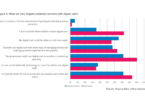Yesterday we wrote about flaws in the crypto-focused FIT 21 Act that was passed by Congress. Another Bill is waiting to be heard, the CBDC Anti-Surveillance Act (Anti-CBDC Bill), which aims to block the issuance of a central bank digital currency (CBDC). While its concern is about the privacy of a retail CBDC, the wording is too broad and will have unintended consequences. That includes blocking a wholesale CBDC that potentially could enhance competition.
Update: as expected, the Bill was passed in Congress with a vote of 216 in favor including three Democrats, and 192 against. To become law it would have to be passed in the Senate and avoid a White House veto.
While most current CBDCs don’t target surveillance, it’s hard to dismiss privacy concerns. Even if CBDCs are designed to preserve privacy, a less benevolent government could change the design once (or if) a CBDC gains traction.
However, the idea of blocking work on a CBDC worries some Democrats, including Representative Maxine Waters and the Atlantic Council. Both expressed concerns that the United States’s absence in CBDC discussions could harm the dollar’s dominant position.
On the other hand, the American Banking Association supports the Bill, emphasizing that banks view a retail CBDC as unfair competition by driving deposits to the central bank.
Federal Reserve Chair Jerome Powell has publicly stated multiple times that issuing a retail CBDC would require Congressional approval, which looks doubtful. Hence, it’s unclear whether this Bill is necessary. The topic of wholesale CBDC is more nuanced, which we’ll return to.
Tightening the CBDC wording
The Anti-CBDC Act omits a definition of a central bank digital currency. It could be improved by differentiating between wholesale usage (limited to institutions) and retail usage. If these two aspects were fixed, the Bill would at least address its stated intention of blocking a retail CBDC rather than have multiple unintended consequences.
The first part of the Bill explicitly blocks CBDCs targeted at indviduals. But several other clauses simply refer to a CBDC without that qualification, including the ones blocking their issuance. This could prevent the issuance of a wholesale CBDC which might be useful for banks and the capital markets.
The CBDC monetary policy clause
Worldwide, some have concerns about a retail CBDC capable of paying interest, which would provide more direct competition to commercial banks. A clause in the Bill addressing this point omits the retail qualification. Hence, it simply prevents CBDC from being used for monetary policy.
“The Board of Governors of the Federal Reserve System and the Federal Open Market Committee shall not use any central bank digital currency, or any digital asset that is substantially similar under any other name or label, to implement monetary policy.”
Current commercial bank reserves held at the central bank are digital. So, depending on how you defined a CBDC, this clause could be interpreted as blocking ALL central bank reserves from being used for monetary policy, which would be odd. Both the Congressional Budget Office and the Atlantic Council raised similar concerns.
This loose wording also appears to block the issuance of a wholesale CBDC.
Obstructing tokenized deposits?
A wholesale CBDC could help with interbank settlement as banks move to offer tokenized deposits. However, in this scenario, tokenized deposits provide competition for payment stablecoins. The Bill’s wording may prevent that competition by blocking a wholesale CBDC. The question is whether that’s intentional.
It might also block the Federal Reserve from initiatives such as wholesale CBDC or tokenized reserves for cross border payments, even where this is an enabler for correspondent banking. This tokenization model is being explored as part of Project Agorá, involving seven central banks, including the New York Federal Reserve and the central banks of England and Europe. These tokenized money projects don’t target individuals, only institutions.
Last year, the Federal Reserve published a paper that explored the nuances of the difference between a reserve as it exists today, which might be tokenized, and a wholesale CBDC. “In order to be distinct from existing central bank money, a new central bank liability would need to have a different legal structure and be recorded on the central bank balance sheet separately from the DI (depository institution) balances held in master accounts,” the authors wrote.
Hence, an existing reserve that is simply tokenized might not be considered a CBDC.
What’s unclear about the Anti-CBDC Bill is whether it is just concerned about preventing a retail CBDC issuance that could compromise privacy. Or whether blocking a potentially useful wholesale CBDC is intended to provide advantages to the cryptocurrency community over traditional finance (TradFi). The latter appears unnecessary given TradFi’s slow pace in embracing innovation and the existing regulatory restrictions.






